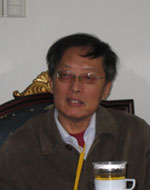|
|
 |
 |

徐明德
Xu Ming-de
 
徐明德(1950-),江苏赣榆人。中国作家协会会员。一级作家。《扬子江》诗刊执行主编。出版诗集:《迷舟》(南京出版社,1990年)、《徐明德短诗选》(银河出版社,2002年)、《我站了一千公里》(人民日报出版社,2002年)等,获《萌芽》文学创作奖(1984年)、江苏作协紫金山文学奖(2008年)等若干奖项。其诗入选《中国新诗年编》(1984年)、《汉语新诗90年名作选析》(2007年)等多种选本及教材。
Xu Ming-de(1950-), born in Ganyu County, Jiangsu Province. Educated at Nanjing University from 1987 to 1989. Served in the army for 13 years in 1970s-early 1980s. Poet, Member of Writers’ Association of China, Editor of Yangtze River Poetry Bimonthly. His publications include The Boat out of Its Bearings (1990), Selected Short Poems (2002) and I Stood on the Train for One Thousand Kilometers (2002). He is a recipient of Literary Writing Prize by Sprout in 1984 and Purple Mountain Literary Prize by Jiangsu Writers' Association in 2008.
|

|

译者
Translator
张子清
Ziqing Zhang
 
张子清是南京大学外国文学研究所教授,北京外国语大学华裔美国文学研究中心客座研究员。哈佛-燕京访问学者(1982-83),美国富布莱特访问学者(1993-94)。中国作家协会会员、全国美国文学研究会常务理事、中国比较文学学会会员。代表作:《20世纪美国诗歌史》(1995,1997)。主编 “华裔美国小说丛书”(译林出版社)、“西方人看中国丛书”(南京出版社)。
Ziqing Zhang is professor of Institute of Foreign Literature, Nanjing University, Nanjing, guest research Fellow of Chinese American Literature Research Center, Beijing University of Foreign Studies, Beijing. He was a visiting scholar as a post-doctoral fellow at Harvard University from 1982 to 1983 and Fulbright Scholar at Harvard University and The University of California at Berkeley from 1993 to 1994. His works include A History of 20th Century American Poetry (1995, 1997), Selected Poems of T.S.Eliot (1985), Selected American Poems (1993) and Birthday Letters by Ted Hughes (1998). He has co-authored Two Sides of the Globe: Contemporary Chinese and American Literatures and Their Comparison (1993) and On American New Pastoral Poems (2006). He has received many awards including The First Prize of Humanities Research Science Foundation of Nanjing University in 1998.
|
 |
等待 |
 |
Waiting |
为等待
那件断了线的毛衣
竞凉透了我的
一生
|
|
I'm waiting for the sweater,
the one with the broken threads;
it has chilled me to the bone
waiting all my life.
|
 |
城市化的苏南村庄 |
 |
The Urbanized Villages in the South Jiangsu Province1 |
稀疏的树上不再有鸟巢,
村子里也不再有袅袅炊烟
缠绕早晨或黄昏的树梢;
不再有鸡鸣狗叫,
也不再有蛙鼓蝉噪。
死板的柏油路代替了
长草的柔软的田间小道;
闹头的汽车卡车喇叭声
代替了牛铃悦耳的叮当。
麦田被切割成舒适小区
里一个个小花园。
这就是我们享受着的农村城市化的现代生活。
|
|
There are no longer bird's nests in sparse trees
nor any smoke rising from kitchen chimneys around
the tree branches in the morning or evening;
nor the crowing of cocks or the barking of dogs,
nor the croaking of frogs or the shrilly chirping of cicadas.
The soft sand paths with exuberant grass
are replaced by the dead-faced asphalt roads
and the ringing of cattle bells by the honking
of cars, buses or trucks, and wheat fields cut into
small yards of flowers in the comfortable home communities.
This is the modern life we enjoy in the urbanized countryside.
[1] It is reported in the mass media that areas in southern China
become more prosperous, townization and citization proceed apace.
Villages become more like market and xiang towns, and county towns
and small cities become more like large cities. The urbanization
process unfolding is caused not only by a stream of rural to-urban
migrants but also by urbanization in place; that is, entire
districts becoming more urbanized at all levels of the rural-urban
continuum.
|
 |
庐山雾 |
 |
Fog on Mt. Lu2 |
晨曦中,我推开一扇窗户
顿时涌进团团浓雾
扑面而来的阵阵寒气
直逼我的五脏六腑
何处是五老峰
哪里是如琴湖
不见花径、仙人洞
难觅美庐 、锦绣谷
朦蒙胧胧的是花
隐隐约约的是树
层层叠叠的青翠之上
满是细细碎碎的水珠
遮蔽所有的悬崖
填平所有沟壑
美与凶险合谋设下陷阱
请小心你的脚步
哦,铺天盖地的庐山雾
来去无踪的庐山雾
似梦非梦的庐山雾
神秘莫测的庐山雾
你无中生有 有目共睹
你有中却无 难有证据
你随风转向肆意弥漫
你有形却无骨
翻手为云你真的很美
你覆手为雨让谁痛苦
那一年,一团难以预料的浓雾
竟让我们迷了道路
Notes:
庐山:地处中国江西省北部九江市庐山区,滨临
鄱阳湖,雄峙长江南岸。
五老峰:庐山东南处五座并列的山峰,仰望俨若
席地而坐的五位老翁。
如琴湖:庐山一湖,因湖形如琴而得名。
仙人洞:位于锦绣谷南端,相传吕洞宾修仙而居。
美庐:蒋介石和宋美龄生活过的别墅。
锦绣谷:庐山长约一段1.5公里的秀丽山谷,这里
四时花开,犹如锦绣,故名。
|
|
In the first faint rays of dawn
When I opened a window,
Rolls of fog rushed in
To chill me to the bone.
Where is the Five Old Men Peak3?
And the Ruqin Lake4?
All the scenic spots have disappeared---
The beautiful Flower Pathway,
The mysterious Fairy Cave5,
The magnificent Meilu Villa6 and
The colorful Jinxiu Valley7.
Dimly visible are flowers,
Bushes, trees and plants.
Layers upon layers of green
Are covered with beads of water.
Steep cliffs are all hidden from us, and
Gullies and valleys covered with fog.
Watch your step, and be careful about
The trap set with beauty and peril.
What a Mt. Lu fog!
It comes from and goes nowhere,
And looks mysterious
Like a day dream.
In a visible form without bones,
Mt. Lu fog spreads willfully with the wind.
It appeared and disappeared in an instant, and
We've witnessed its magical transformation,
But can hardly bear a solid evidence of it
To convince other people with.
Mt.Lu fog was beautiful one moment
When it became white clouds,
And it tortured us the next
When it became a terrible rainstorm.
We vividly remember we all lost our way
That year when it appeared
Suddenly and unexpectedly8.
[2] Mt. Lu is a famous summer resort in Jiangsi Province, a national
park which is situated between the Panyang Lake and the Yangtze River.
[3] The five peaks in the southeast of the Mt.Lu, which look like five
old men sitting together.
[4] The lake in the Mt.Lu, which looks like a zither.
[5] According to Eight Divinities Come through the Sea, a Taoist fairy
tale, once upon a time, Lǚ Dong-bin, one of the eight divinities or
immortal semi-gods, practiced austerities in this cave.
[6] It refers to the villa where Chiang Kai-shek and his wife Soong Mei-
ling stayed in their vacation.
[7] It is a beautiful valley, 1.5 kilometers long, where there is a lush
growth of flowers of every season.
[8] The Eighth Session of the Eighth National Congress of the Communist
Party was held in Mt.Lu, 1959.
|
|
|







